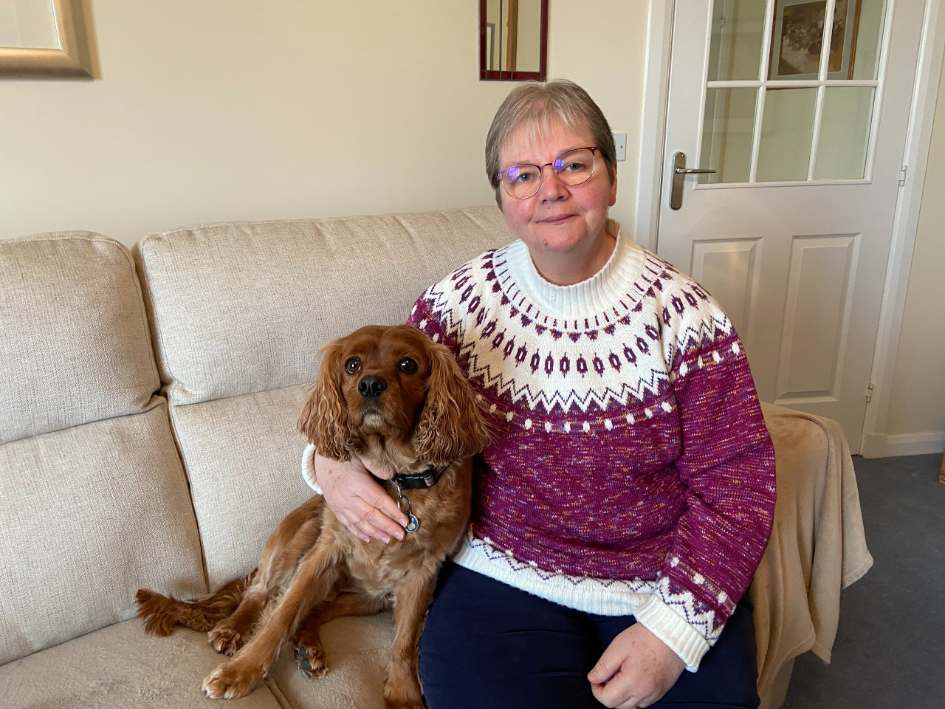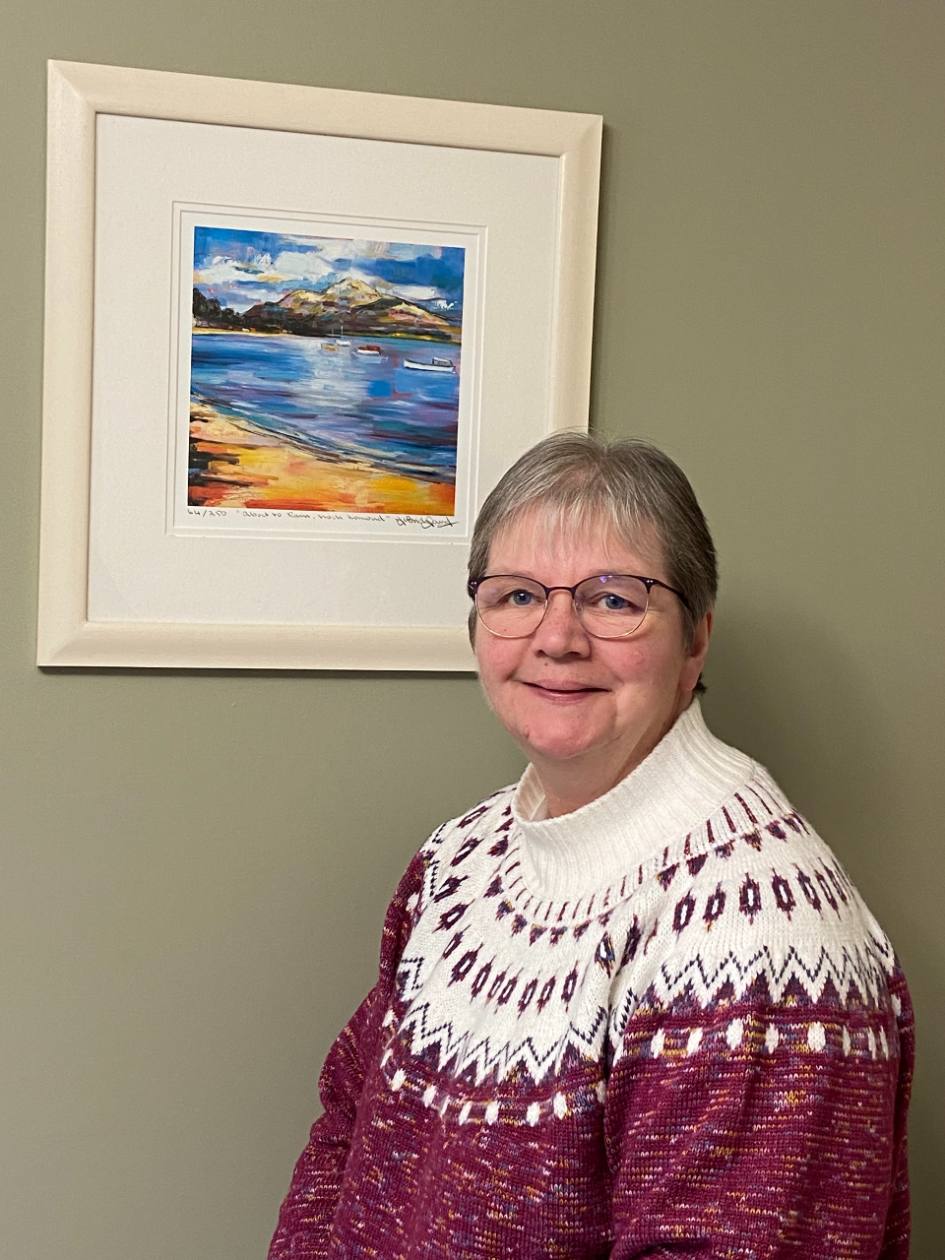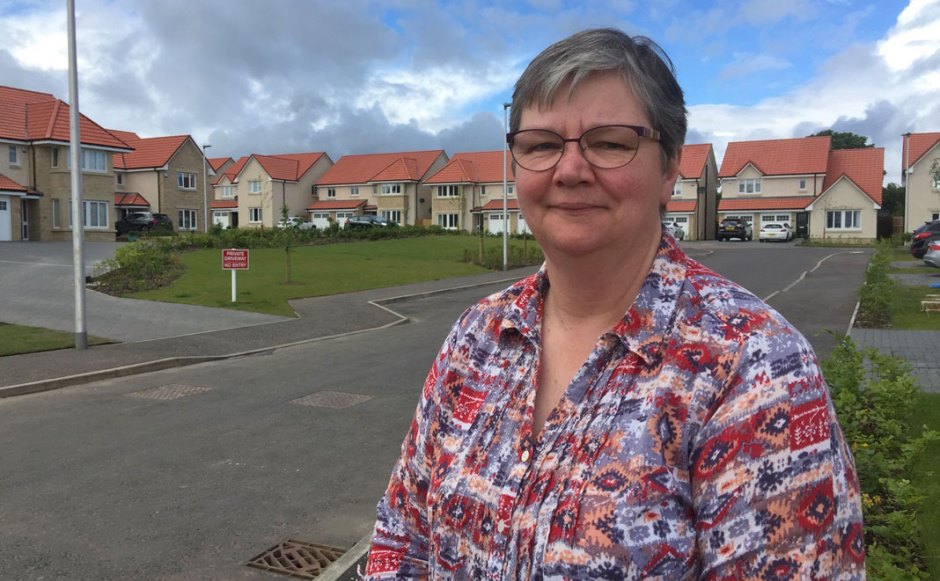January 2025: Rev Elisabeth Spence
The Church of Scotland's Talking Ministry monthly series shares personal stories from those serving in Christian ministry, along with resources filled with questions, prayers and reflections to help encourage reflection on how God might be calling you at this time
In the first instalment of 2025, Rev Elisabeth Spence talks about a varied career which has included parish ministry, industrial chaplaincy and helping establish a new ‘church without walls' as a pioneer minister.
My Ministry: Rev Elisabeth Spence
Brought up in Dunfermline, Rev Elisabeth Spence was ordained into the Church of Scotland following a career working with children with special educational needs. Married to Denise, she recently stepped down as locum minister at Drylaw Parish Church.
When did you become a Christian?

As a child, I would be packed off to Sunday school so my parents could get a bit of peace and quiet. Inevitably, as a teenager, I became a Sunday school teacher, but I was also very involved with Girlguiding, which in those days meant you had a link with the church where you had your meetings.
After I moved to the Black Isle to work as a teacher, I started going to Rev Susan Brown's church at Kilearnan. Susan had only been there a few weeks and this was her first charge so she had a lot of energy – which she still does – and when she asked for someone who could play the guitar or was willing to go on the Sunday school rota, I volunteered and suddenly was more involved in the practicalities. That's when I realised I needed to make a commitment to the Church and to Christ.
I was a newly committed Christian and within six months I felt called to ministry, but I hadn't even read all the Bible yet, so how could I put my hand up to be a minister?
How would you describe your journey into ministry?
I was a newly committed Christian and within six months I felt called to ministry, but I hadn't even read all the Bible yet, so how could I put my hand up to be a minister?
I found out about being a deacon, which seemed quite interesting, but didn't feel like it was for me, so ultimately, I went to Susan and told her that I felt a call.
Susan suggested I just apply and see what happens. I realised that there had been something churning inside of me and even at the point of applying to selection school, I felt rested and didn't feel the need to resist what was to come next.
It might even have been an advantage, being such a new Christian. I hadn't been involved in the structures of the Church and wasn't even on a congregational board, so I was bringing questions because I genuinely didn't know the answers. I thought I wasn't going to be accepted anyway, so I just relaxed and didn't feel any pressure.
By the end of the selection course, I knew that I really, really wanted to do this.
Did you have an idea of what form your ministry would take?
I assumed it would be parish ministry just because that's where most people start, A lot of my friends were in Glasgow, so I thought I would go there. I discounted going further north because I had already lived in the Highlands and didn't need to do that again and felt the same with Dundee where I'd been to college, but I ended up in Dundee at Lochee Old and St Luke's, where I had to find out what being a parish minister is all about. I remember waking up the day after my ordination and thinking: ‘I don't know what I'm supposed to do now.' So, I went down to the local primary school where I became chaplain because I thought: ‘I know schools – I'll start there.'
Lochee was a good place to begin ministry. Folk were open to something new, not because there was anything wrong with what had gone previously, but because there was a momentum to see what was next for the church.
My next parish was Ibrox Parish Church in Glasgow and they would also try anything once and see what happened.
Have you had any particular highlights in your career?

Of all the great things that happened in both churches, I would say developing a better working system.
We got rid of the word ‘committee' and started saying ‘work group': it was a group that was going to work, not a committee that was going to speak. They were led by folk in the church and we took the view that the church is part of the community and we are God's people, so if you had anything to offer, you didn't have to be a member or elder, you could just be a regular attendee.
Both congregations developed things. The holiday club was a success in both churches. We also created a dementia group and opened a food bank. The point was that it wasn't me managing from the top, it was me encouraging people to discover through these groups how they could respond to the Gospel message of ‘love one another'.
The proof that it worked was when I moved on. The work of both congregations continued and developed because they hadn't relied on me as minister to lead, but to encourage and support them. So, the highlight for me is that I feel I encouraged two congregations to respond to the needs of the parish and the folk who live there.
In between the two parishes, I moved into industrial mission, which we now call workplace chaplaincy.
I worked alongside Glasgow City Council and two large shopping centres. There is a phrase in work place chaplaincy which is ‘loitering with intent'. That means just being around people in their workplace, and if someone wasn't too busy, I would just say hullo.
I have one abiding memory of that when one woman I was speaking to told me this was the first Christmas without her mother. Suddenly, you are moving into a different conversation. We did talk for a wee while about how she was feeling and then, at the end, she looked at me and said: ‘I didn't know all that was in my head.'
A few weeks later, I asked her how was Christmas, and she said it wasn't as bad as she thought it was going to be, and thanked me for listening.
That sort of thing would happen such a lot and what would surprise me is that, sitting at their desks with all their colleagues around them, folk were happy to say what was on their mind. That's why you ‘loitered with intent'.
People make a connection with you, so you then get a request for a funeral or a wedding. For so many people, a workplace chaplain can be the only link they have with church or anything to do with God, so I always said yes when they asked me to do something.
What drew you to pioneer ministry?
We moved from Glasgow to Edinburgh because my wife's job had changed and bought a house in a new 1,200 home estate in Bonnyrigg, and that was exactly where a new pioneer ministry was being developed.
I felt I had to apply for this job to see if God had put me in the very place where it was happening. I went to the interview and in my naivety, I told the panel that I had no idea what this job was about. They told me that nobody did either and, bless them, they took a chance and offered me the post.
What I loved about it was exactly that: you have no idea what is going to work and what isn't or who you are going to work with because you are standing in the middle of a newly built housing estate.
What skills do you need for pioneer ministry?
The first thing was being able to network. The only thing in the estate, apart from housing, was the primary school, and the head teacher was very welcoming. The local church also helped me through the five years I was there.
The other way to network in this day and age is via social media. I found a title, Hopefield Connections, and I connected with the estate Facebook page. That gave me a platform to say what we were about.

Those are the practical things, but if you are a pioneer minister of any description, you need creativity and imagination and you need to be observant.
I noticed at one point that mums would drop their children off at school and then stand around talking, so I thought about giving them somewhere to go. Opposite the school was a car park, so I got a gazebo and, with the help of folk from the local church, started offering coffee and tea and fresh baked scones on a Friday.
It was exactly the same as industrial mission – you would talk about nonsense and then talk about something real.
You also need bravery.
When we started a dementia club at Ibrox, we were planning and holding meetings when someone asked what we needed, and then someone said: ‘a kettle and packet of biscuits.' You just need to have the bravery to say we haven't quite got this yet, but let's batter on and do it, and also the courage to say that something didn't work and stop.
Alongside bravery, you need patience. It takes a while to make connections and for people to trust you and talk about the things that are in their hearts.
I also believe that every church is a pioneer ministry. If you try something new, that is pioneering. If the church responds to the parish and what they see and hear, that is pioneering. Every church has the ability to do that.
What other advice would you give to new ministers?
I have four points and they all begin with R.
I had a lot of probationers over the years and the first thing I would tell them is you need reliability. If you say you will do something, do it, if you say you will be there, be there. Avoid putting meetings above people if you've made a commitment to those people. Meetings are important, but people are more important.
My next point would be: Refresh. I have met many ministers who hold it as a badge of honour that they never take a day off, but you need time to refresh yourself.
My next R would be: Review. One of my biggest bugbears is that you can leave university and finish probation and you never need to review anything again because no one asks you to. Make sure you use pastoral supervision or at least set aside time to regularly review your ministry, not just in a practical way, but in a spiritual way.
And the last thing I would say is: Rejoice. God has called you to a wonderful ministry to serve the Church and to serve the people.
As one of a number of gay ministers within the Church, what has been your experience?
I have to say that my wife and myself have been more than accepted wherever we have gone. At the beginning I just didn't mention that I was a gay woman, then, as society moved on and the Church moved and I myself moved, I started asking why I wouldn't say that. It's part of who I am.
The Church has changed and I am pleased that it has. It's in incremental stages, but I think the Church of Scotland has been very brave where other churches have not managed although it has been difficult and whatever your view, it has been painful for people.
We had a blessing service in a non-church venue with a friend who was a minister and after our civil partnership. Then, when same sex marriage was introduced, we upgraded. I happened to mention that Denise and myself had got married and the first question from the congregation was: ‘When's the party?' That was very affirming for us. They weren't tolerating, they were accepting.
If a gay person was thinking about becoming a minister in the Church of Scotland, that shouldn't be a barrier, and it hasn't been for a while.

January discernment resources
Who am I?
When we think of our Christian faith, it defines in many ways how we understand ourselves in relation to God. It also underpins how we understand ourselves in relation to others and the world around us. Knowing that we are loved and held by God offers us an identity that is bound up in something much greater than the unique life we live.
To understand that we not only belong to God, but are part of the wider Christian family is a powerful thing. How do we understand our place, our part, our call to serve in the living of our lives?
The God who made the world and everything in it, he who is Lord of heaven and earth, does not live in shrines made by human hands, nor is he served by human hands, as though he needed anything, since he himself gives to all mortals life and breath and all things. From one ancestor he made all nations to inhabit the whole earth, and he allotted the times of their existence and the boundaries of the places where they would live, so that they would search for God and perhaps grope for him and find him — though indeed he is not far from each one of us. For ‘In him we live and move and have our being'.
Acts 17:24-28
We are all called by God to something…in all our seeking and searching, God is calling each of us to discover who we most fully are in this relationship. God is not far from us, and has revealed in Jesus Christ and by the Spirit this real and refreshing presence that shapes our days and our destination.
This call is always a journey, and movement is at the heart of any journey. Where we are today in our relationship with God may be quite different than in the past, and perhaps God is leading us on to something new. Our identity is God is being continually reshaped as we open ourselves to what God is doing and saying now.
O LORD, you have searched me and known me. You know when I sit down and when I rise up; you discern my thoughts from far away. You search out my path and my lying down, and are acquainted with all my ways. Even before a word is on my tongue, O LORD, you know it completely. You hem me in, behind and before, and lay your hand upon me. Such knowledge is too wonderful for me; it is so high that I cannot attain it.
Psalm 139
To contemplate/discuss
Beginning from here, how do I think of myself in relation to God?
Is this relationship one of movement or does it feel static?
What could I do to deepen and develop my faith?
What are the patterns that have shaped my faith journey?
Who are the people that accompany me on the way?
Is God saying something new to me today?
Prayer
God of each and every moment, I thank you that you have given me a home in you. You hear me and hold me, and offer a life of fullness. Help me to know your call and assurance in my life, and to keep exploring with you where that journey may lead. Amen
More information
"Now, with God's help, I shall become myself."
Søren Kierkegaard
If you would like to consider how God might be calling you to serve at this time, you may want to discuss further with your minister or be in touch with your Presbytery to explore local opportunities.
If you are interested in exploring a call to the recognised ministries of the Church, you can find more information on our vocations page and can contact ministry@churchofscotland.org.uk for a Discernment Conversation with one of the Recruitment Team.
More information
If you would like to consider how God might be calling you to serve at this time, you may want to discuss further with your minister or be in touch with your Presbytery to explore local opportunities.
If you are interested in exploring a call to the recognised ministries of the Church, you can find more information on our vocations page and can contact ministry@churchofscotland.org.uk for a Discernment Conversation with one of the Recruitment Team.